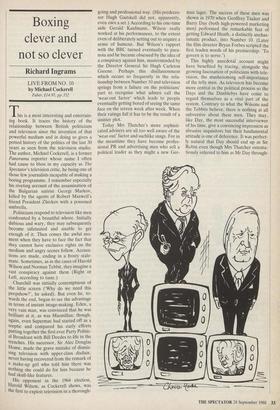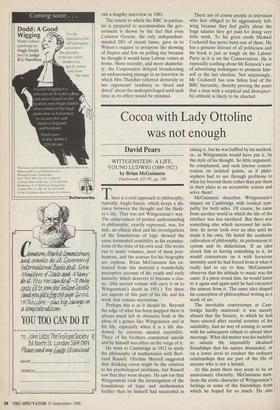Boxing clever and not so clever
Richard Ingrams
LIVE FROM NO. 10 by Michael Cockerel! Faber, £14.95, pp.352 This is a most interesting and entertain- ing book. It traces the history of the relationship between British politicians and television since the invention of that powerful medium and in doing so gives a potted history of the politics of the last 30 years as seen from the television studio. The author, Michael Cockerell, is a former Panorama reporter whose name I often had cause to bless in my capacity as The Spectator's television critic, he being one of those few journalists incapable of making a boring programme. I remember especially his riveting account of the assassination of the Bulgarian satirist Georgi Markov, killed by the agents of Robert Maxwell's friend President Zhivkov with a poisoned umbrella.
Politicians respond to television like men confronted by a beautiful whore. Initially dubious and wary, they may subsequently become infatuated and unable to get enough of it. Then comes the awful mo- ment when they have to face the fact that they cannot have exclusive rights on the medium and angry scenes follow. Accusa- tions are made, ending in a frosty stale- mate. Sometimes, as in the cases of Harold Wilson and Norman Tebbit, they imagine a vast conspiracy against them (Right or Left, according to taste.) Churchill was initially contemptuous of the little screen ('Why do we need this peepshow?', he asked). But even he, to- wards the end, began to see the advantage in terms of instant image-making. Eden, a very vain man, was convinced that he was brilliant at it, as was Macmillan; though, again, even Supermac had started off as a sceptic and compared his early efforts putting together the first ever Party Politic- al Broadcast with Bill Deedes to life in the trenches. His successor, Sir Alec Douglas Home, made the grave mistake of dismis- sing television with upper-class disdain, never having recovered from the remark of a make-up girl who told him there was nothing she could do for him because he had skull-like features.
His opponent in the 1964 election, Harold Wilson, as Cockerel! shows, was the first to exploit television in a thorough- going and professional way. (His predeces- sor Hugh Gaitskell did not, apparently, even own a set.) According to his one-time aide Gerald Kaufmann, Wilson really worked at his performances, to the extent even of deliberately setting out to acquire a sense of humour. But Wilson's rapport with the BBC turned eventually to para- noia and he became obsessed by the idea of a conspiracy against him, masterminded by the Director General Sir Hugh Carleton Greene. Perhaps this disillusionment which occurs so frequently in the rela- tionship between Number 10 and television springs from a failure on the politicians' part to recognise what admen call the `wear-out factor' which leads to people eventually getting bored of seeing the same face on the screen week after week. When their ratings fall it has to be the result of a sinister plot.
Today Mrs Thatcher's more sophisti- cated advisers are all too well aware of the `wear-out' factor and suchlike snags. For in the meantime they have become profes- sional PR and advertising men who sell a political leader as they might a new Ger- man lager. The success of these men was shown in 1970 when Geoffrey Tucker and Barry Day (both high-powered marketing men) performed the remarkable feat of getting Edward Heath, a distinctly unchar- ismatic product, into Number 10. (Later the film director Bryan Forbes scripted the first leaden words of his premiership: `To govern is to serve.') This highly anecdotal account might have benefited by tracing, alongside the growing fascination of politicians with tele- vision, the mushrooming self-importance of the telly men. As television has become more central in the political process so the Days and the Dimblebys have come to regard themselves as a vital part of the system. Contrary to what the Wilsons and the Tebbits believe, there is nothing at all subversive about these men. They may, like Day, the most successful interviewer of his time, give a convincing impression as abrasive inquisitors but their fundamental attitude is one of deference. It was perfect- ly natural that Day should end up as Sir Robin even though Mrs Thatcher ostenta- tiously referred to him as Mr Day through- out a lengthy interview in 1983.
The extent to which the BBC in particu- lar is prepared to accommodate the gov- ernment is shown by the fact that even Carleton Greene, the only independent- minded DG of recent times, gave in to Wilson's request to postpone the showing of Steptoe and Son on polling day because he thought it would keep Labour voters at home. More recently, and more shameful- ly, the Corporation delayed broadcasting an embarrassing passage in an interview in which Mrs Thatcher referred derisively to her opponents' tendency to 'drool and drivel' about the underprivileged until such time as its effect would be minimal. There are of course people in television who feel obliged to be aggressively left- wing because they feel guilty about the huge salaries they get paid for doing very little work. To his great credit Michael Cockerell has never been one of them. He has a genuine distrust of all politicians and his book is just as tough on the Labour Party as it is on the Conservatives. He is especially scathing about Mr Kinnock's use of advertising techniques to promote him- self in the last election. Not surprisingly, Mr Cockerell has now fallen foul of the BBC hierarchy, thereby proving the point that a man with a sceptical and disrespect- ful attitude is likely to be aborted.































































 Previous page
Previous page